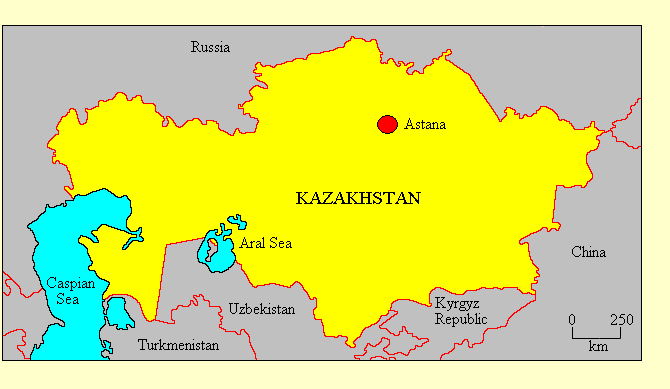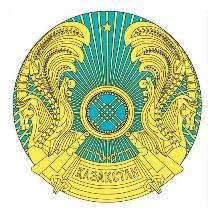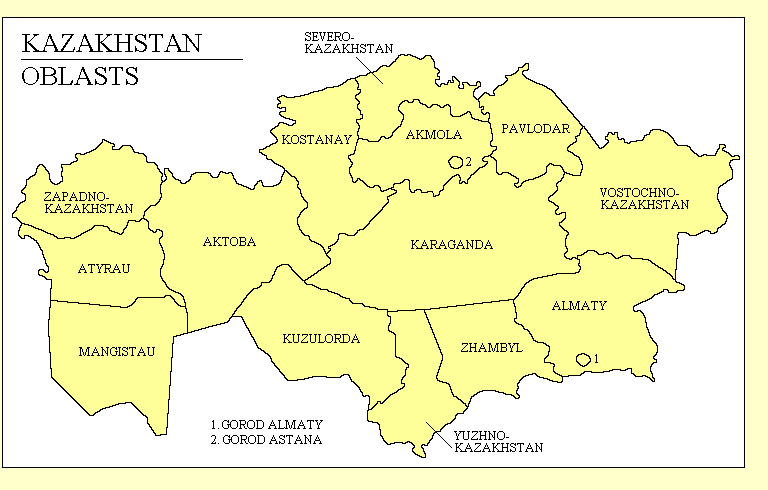
REPUBLIC OF KAZAKHSTAN
• Official name: Qazaqstan Respublikasi (Republic of Kazakhstan)
• Location: Central Asia
• International organisations: Commonwealth of Independent States, Organisation of Islamic Conference,
Organisation for Security and Co-operation in Europe, United Nations
• Borders: China, Kyrgyz Republic, Russia, Turkmenistan, Uzbekistan
• Coastline: None
• Land area: 2,717,300 Km2
• Population: 16,000,000 (estimate)
• Annual GDP (PPP) per capita: US$11,800 (2009 CIA estimate). World ranking: 73

• Ethnicity: The Kazakhs, a Turkic people, comprise 67% of the population. There
is a large (18%) Russian minority, mainly in the north, and minorities of
Ukrainians (2.7%), Uzbeks (2.6%), Uighurs (1.5%), Tatars (1.4%) and Germans (1.3%). The proportion of
Kazaks is increasing due to Russian emigration and Kazakh immigration from Russia.
• Languages: Kazakh is the official language, and is the first language of about 60% of the population.
Russian is the first language of about 25%, including many Kazakhs, and is in practice the language of
government, business and media.
• Religion: Sunni Moslem 63%, Orthodox Christian 35%, Protestant 2%.
• Form of government: Formally, a presidential democratic republic. In practice, an
authoritarian regime. Kazakhstan is divided into 14 provinces and three cities.
• Capital: Astana. Many government function are still located at the former capital, Amaty (Alma-Ata).
• Constitution: The Constitution of the
Republic of Kazakhstan came into effect on 30 August 1995.
• Head of state: The President, elected by direct universal suffrage for a seven-year
term. The President has wide powers and dominates the government.
• Head of government: The Prime Minister, appointed by the President. Given the
weakness of the legislature and the political parties, the Prime Minister is in
practice accountable only to the President.

• Legislature: Kazakhstan has a bicameral legislature, the
Parliament (Parlamenti).
The Assembly (Mazhilis) has 77 members, elected for four-year terms, of whom 67 are
elected from single-member constituencies and 10 by proportional representation.
The Senate has 47 members, 40 elected for six-year terms from two-member constituencies
by local assemblies, and seven appointed by the President.
• Electoral authority: The Kazakhstan Election
Commission administers national elections.
• Freedom House 2011 rating: Political Rights 6, Civil Liberties 5
• Transparency International Corruption Index: 29% (105 of 178 countries rated)
• Reporters Without Borders Press Freedom 2010 Index: 31.5% (162 of 178 countries rated)
• Heritage Foundation Economic Freedom 2010 Index: 62.1% (78 of 178 countries rated)
Political history
The Kazakhs were a nomadic people of the Central Asian steppe before being brought
under the control of the Russian Empire in the early 19th century: Alma-Ata was founded
by the Russians in 1854. When the Russian Empire disintegrated in 1917, the Kazakhs
proclaimed their independence, but the Russian Communists invaded the area in 1920, and
by 1925 the whole country was under Soviet control. Kazakhstan became a full republic of
the Soviet Union in 1936. There was large-scale Russian immigration into the republic.

When the Soviet Union began to collapse in 1990, the Kazakh Communist leader,
Nursultan Nazarbayev, moved to declare
Kazakhstan independent and to secure his position as its
ruler. The 1993 Constitution created the institutions of a democratic state, but Nazarbayev
has followed an increasingly authoritarian policy. In 1995 he introduced a new
Constitution giving him the power to rule by decree and to dissolve Parliament if it
obstructs his wishes. The Parliament is in any case to be elected on a "non-party" basis. The only
political parties of any significance are Nazarbayev's
Light of the Fatherland (Nur Otan) and
the Communist Party. There is no opposition representation in either house of the legislature.
Freedom House's 2011
report on Kazakhstan
says: "Kazakhstan is not an electoral democracy. The constitution grants the president considerable control
over the legislature, the judiciary, and local governments. The removal of term limits for the country's
"first president" in May 2007 cleared the way for President Nursultan Nazarbayev to seek re-election at the
end of his current seven-year term in 2012. A referendum initiative approved by Parliament in December 2010
and slated for 2011 could extend Nazarbayev's term to 2020... Corruption is widespread at all levels. Rakhat
Aliyev, Nazarbayev's former son-in-law, issued allegations of corruption among top officials after falling
out of favor with the regime in 2007... While the constitution provides for freedom of the press, the government
has repeatedly harassed or shut down independent media outlets... As in previous years, independent media suffered
attacks, arrests, and libel judgments in 2010... Despite constitutional guarantees, the government imposes
restrictions on freedom of association and assembly... The constitution makes the judiciary subservient to the
executive branch. Judges are subject to political bias, and corruption is evident throughout the judicial system."
Updated November 2011
|


